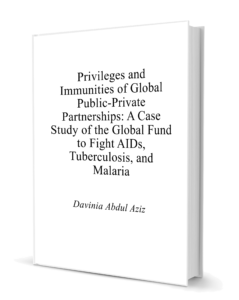![]()

Davinia Abdul Aziz
Read PDFRead PDFThe question of whether it is at all appropriate to extend privileges and immunities regimes beyond international organizations to the increasingly ubiquitous global public-private partnership structure has received little attention to date in the scholarly literature. This article examines this question through a study of the Global Fund to Fight AIDS, Tuberculosis and Malaria, a permanent global public-private partnership that formally incorporates non-state actors as equal players in its core governance structures. The article concludes that considerations of genesis and administrative law-type analyses of institutional design may, to some extent, substitute for the constituent treaty of classical international law in order to identify which global public-private partnerships should benefit from privileges and immunities, as well as the specific privileges and immunities to be granted in each case to facilitate the effective fulfilment of these partnerships’ mandates.

